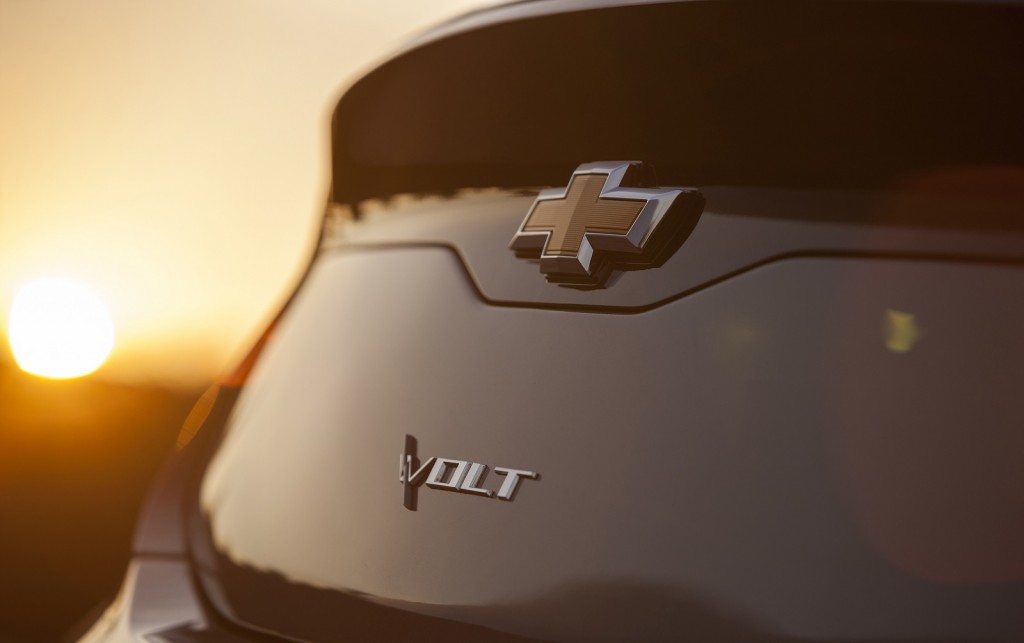Chevy Volt owners, and even Chevrolet itself, are usually quite proud of the amount of miles the range-extended electric car covers on grid electricity.
The company said last week that 63 percent of all Volt miles driven have been covered on grid power, totaling more than half a billion miles altogether.
But there's one set of Volts that appears to have driven almost exclusively on gasoline, only being plugged in rarely--if ever.
DON'T MISS: 2016 Chevrolet Volt To Debut At Detroit Show, First Teaser Photo Released
Based on two separate accounts, those are Volts purchased and run by large fleet operators.
And the very different use patterns of these Volts speaks both to the driver education required for plug-in electric cars, and to corporate policies that currently reward gasoline use and penalize plug-in power.

2016 Chevrolet Volt - first teaser image, Aug 2014
Last month, InsideEVs related the story of a group of used 2012 and 2013 Volts for sale, with high mileages (30,000 to 100,000 miles) but lifetime blended fuel-economy readings of only 34 to 39 miles per gallon.
Readings of 80 to 100 mpg (blended) are common among owners who use their Volts 40 miles a day or less and recharge the cars overnight. Some Volt owners who plug in as often as possible even complain that the car's display "only" goes as high as 250 mpg.
The seller, Jason Edwards of Maters Motors, confirmed that he had acquired the used Volts from fleets--after they had concluded it was time to replace the cars based on mileage.
Wrong incentives
"Fleet vehicles are often mismanaged," Edwards told InsideEVs.
"The fleet owners have taken advantage of government and state incentives," he noted.

2013 Chevrolet Volt - Driven, December 2012
But the challenge is that "operators are often reimbursed for the gas they buy, but not the electricity in their home for plugging in--so they just drive them."
And data from an earlier Dutch study of fleet vehicles backs up that assertion.
In 2012, researchers studied 60 range-extended electric and plug-in hybrid vehicles in use by fleet leasing company Arval.
The 30-mpg Volt
They found that the cars, on average, used 80 percent more fuel than the ratings provided by the manufacturers. (Those ratings, on the European test cycle, were generally higher than EPA ratings would have been for the same cars.)
The worst usage figure came from the owner of an Opel Ampera (essentially a European version of the Chevrolet Volt) whose fuel economy came in at 30.2 mpg (7.8 liters per 100 km).

2011 Chevrolet Volt plugged into Coulomb Technologies 240V wall charging unit
The lesson here is that incentives are important: If you only reimburse owners of range-extended electric cars in fleet use for the gasoline they buy--but not for the electricity they use--then those cars won't get recharged very often, if at all.
In the end, we suspect that cost-concscious fleet owners will figure this out.
ALSO SEE: What Improvements Do Owners Want From Next-Gen 2016 Chevrolet Volt?
They'll analyze the higher purchase costs of vehicles with both engines and plugs, look at the gasoline usage--30 to 35 mpg isn't particularly laudable for a compact four-seat hatchback, these days--and notice that their lifetime ownership cost is higher than it should be.

Gas prices, San Francisco, CA
Change will come?
Then comes the process of working out how a corporate should reimburse an employee for some number between 5 and 20 kilowatt-hours of electricity drawn from the employee's home.
Consider that at 12 cents per kilowatt-hour (the U.S. average), a Volt traveling on electricity will cost $1.20 to $1.50 for 40 miles--against about $5.00 for gasoline to cover the same 40 miles at 30 to 35 mpg.
Over time, corporations will add up the cost differentials--and start to figure out how to change their policies.
One of the duties of vehicle-fleet managers everywhere is to reduce the overall operating cost per mile of the company's cars and trucks.
So while it won't be easy, we suspect the savings in fuel cost will make it happen eventually.
None too soon, from the point of view of most Volt owners and electric-car advocates.
_______________________________________________













